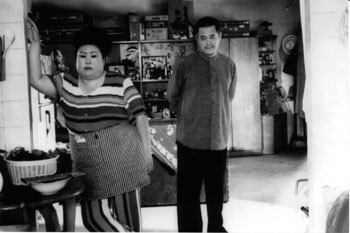Heartbreak Hotel
Poignant ‘Happy Times’ is sweetly understated
By Sara Bir
A lonely older man longing for companionship, a wicked stepmother, a blind girl–Happy Times has all the elements of a melodrama, the kind of setup that network executives would deploy in a Hallmark Presents television special. But director Zhang Yimou’s latest is so sweet and understated that Happy Times comes across instead as a tenderly constructed, bittersweet comedy.
An aging bachelor of little means, Zhao (Zhao Benshan) is so desperate to get married that it’s more pathetic than endearing, as he woos widows only to be promptly dumped. His latest potential bride is a plump, milky divorcée (Dong Lihua) who sweet-talks him into financing an elaborate wedding that he can’t afford.
To make some money, Zhao fixes up an abandoned bus to rent out by the hour to young lovers, and thus the Happy Times Hotel is born. Zhao is too stodgy to allow his customers to enjoy themselves undisturbed, though, and the “hotel” does not wind up generating any money.
Visiting the woman Zhao optimistically calls his fiancée, he meets her fat, bratty son and teenage stepdaughter Wu (Dong Jie), who is blind. Birdlike and quiet, Wu’s presence in the household is ignored. After Zhao brags to his fiancée about his high-profit luxury “hotels,” she demands that he give Wu a job to get her out of the house. As he’s bringing Wu to the Happy Times Hotel, however, he finds his bus being hauled off to the dump.
So Zhao lies and says that the hotel is closed for renovations. He brings Wu back to her stepmother, who again insists that Zhao give Wu a job and points out that Wu is an excellent masseuse. At a loss, Zhao concedes, saying he will employ Wu in another of his hotels.
Zhao consults with his friends, who contend that since Wu is blind, Zhao can easily trick her. They construct a mock massage room in the corner of an abandoned warehouse. His friends all line up to receive massage after massage, tipping Wu with Zhao’s money.
Wu’s on to this, but she doesn’t say anything. As the days pass, her initial resentment toward Zhao turns to affection, especially after Zhao warms up to Wu’s naive charm.
Zhao begins to realize that his fiancée is not what he’d hoped she was. His fake massage parlor scheme is not bringing him any closer to a wedding–and Wu can’t keep up her charade much longer. Everything unravels.
Set in modern urban China, Happy Times takes this Billy Wilderesque setup and humanizes it, letting its characters’ flaws guide the movie. Dong Jie’s Wu never comes across as too precious or too blind; rather than marvel at how convincingly she portrays a blind girl, we simply accept that Wu is blind.
Trained as a dancer, Jie’s movements and mannerisms–her fidgeting, the way she tilts her head close to objects she’s holding, the tiny smile she gradually allows to emerge–reveal more about Wu than any of her lines do. As Zhao, Benshan paints a lovable buffoon whose endless little schemes only serve to bring on more woes.
Zhang Yimou departs from the bleakness of his earlier films, such as 1991’s Raise the Red Lantern, with subtle comic moments and a bright look that dances with splashes of color. He keeps both the humor and the drama from going over the top so that Happy Times stays believable even it when it’s chasing sentimentality. This is a heartfelt movie whose simplicity and earnestness contrast nicely to the rest of summer’s overblown movie crop.
‘Happy Times’ opens at the Rafael Film Center on Friday, Aug. 16.
From the August 15-21, 2002 issue of the North Bay Bohemian.











